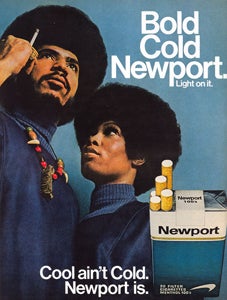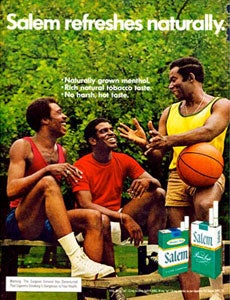FDA advisers suggest menthol ban
UPDATE: The decision is in. After studying the issue for a year, on Friday the Food and Drug Administration’s advisory panel recommended “the removal of menthol cigarettes from the marketplace,” saying the change would benefit public health. A final decision on menthol–which could be months or years away–rests with experts at the FDA Center for Tobacco Products.
Here’s the original story posted earlier.
Cinnamon, vanilla, chocolate, strawberry. In 2009, a sweeping anti-smoking law banned most added flavors from cigarettes
There was one big exception. Menthol was not on the list.
Tobacco control activist Valerie Yerger is a researcher at the University of California, San Francisco.
She studies tobacco company documents that once were secret, looking for marketing patterns and consumer ideas about cigarettes.
Yerger says menthol makes cigarettes more attractive to young people and other inexperienced smokers. Experts say menthol is also a mild pain reliever that masks the coughing and throat irritation that can come with the first puffs on a cigarette.
Tobacco insiders have known for a long time that menthols are a great “starter cigarette,” Yerger said.
“If you wanted to keep our youth from starting, you would ban menthol,” she said.
Black smokers are four times more likely to choose menthols than whites, and Yerger is among those who say that the failure to ban menthol is a “social justice” issue that disproportionately affects African Americans.
A panel of experts, the Tobacco Products Scientific Advisory Committee, is mulling a menthol ban and is supposed to have a recommendation for the U.S. Food and Drug Administration by March 23.
More than minty flavor
Tobacco companies have sold menthol as simple flavoring, but pulmonologist Frank Leone says it’s much more. Leone directs the Comprehensive Smoking Treatment Program at the University of Pennsylvania.
“They didn’t choose cherry or chocolate, they chose menthol. There are very specific reasons why they chose menthol so many years ago,” he said.
 Leone says menthol was picked for its vaguely “medicinal smell” and its association with cough drops and other minty health aids. In the 1940s and 50s, there was still a vigorous debate about whether cigarettes were actually harmful. Cigarette makers began to push the “health benefits” of menthols, Leone says, while using blue and green packaging to position the cigarettes as “refreshing.”
Leone says menthol was picked for its vaguely “medicinal smell” and its association with cough drops and other minty health aids. In the 1940s and 50s, there was still a vigorous debate about whether cigarettes were actually harmful. Cigarette makers began to push the “health benefits” of menthols, Leone says, while using blue and green packaging to position the cigarettes as “refreshing.”
That’s old news, says William True, senior vice president of research and development at the Lorillard Tobacco Company.
“There were some beliefs back in pre-1950s that maybe if you had a cold or maybe if you weren’t feeling very well, maybe a menthol cigarette would make you feel better,” True said. “That’s very, very ancient history and that’s nothing that tobacco companies prescribe to today, or even remotely promote.”
Lorillard makes Newport cigarettes, the top-selling menthol brand in the United States. Menthols account for about a third of U.S. cigarette sales.
Tobacco companies are campaigning against a possible ban and industry has non-voting representatives on the FDA advisory panel. They seemed to score a big win this month when the committee posted draft chapters from its coming report. True says the chapters show that menthol and non-menthol smokers face the similar health risks. “Looking at that hard science, a ban would be completely unjustified,” True said.
Scientists found no difference when they looked for evidence that menthol causes higher levels of disease – or exposes smokers to higher levels of smoke chemicals, True says.
But the FDA’s science panel isn’t only considering science. The government asked Yerger and colleagues at UCSF to dig into the tobacco documents to better understand the industry’s marketing practices.
Blacks and menthol
 Yerger says her research shows that in the 1960s, ’70s and ’80s, the leading menthol marketers handed out free cigarettes and sponsored social and sporting events to build relationships with key groups in the black community.
Yerger says her research shows that in the 1960s, ’70s and ’80s, the leading menthol marketers handed out free cigarettes and sponsored social and sporting events to build relationships with key groups in the black community.
“We’re talking about the national leader groups. The National Urban League, the NAACP. We’re talking about your major fraternities and sororities, civic groups, any group that you can think of,” said Yerger, an elder with the National African American Tobacco Prevention Network.
Today more than 80-percent of African-American adolescent smokers use the minty-flavored cigarettes, according to a draft post from the advisory panel.
Other African Americans, however, oppose a menthol ban.
Niger Innis is spokesman for the Congress of Racial Equality, a national civil rights group. He wants FDA advisors to consider a possible boomerang effect from a menthol ban. CORE, the National Black Chamber of Commerce and some black law enforcement groups say a ban could boost the market for illegal menthol cigarettes.
“It would drive more smokers to the unlicensed, unregulated side of the street,” Innis said.
FDA advisors are also considering whether menthol makes cigarettes harder to quit.
Some researchers are now studying the idea that menthol changes the chemistry of nicotine — and how the stimulant affects the brain. Leone, the pulmonologist, says the “powerful chemistry” of nicotine and menthol may be even stronger than the “powerful advertising” that has been directed toward blacks.
“If the community of African Americans tend to be related, and tend to share genes more frequently, then it is possible that they are sharing genes which influence their likelihood of responding to the presence of menthol in the cigarette,” he said.
“I think at minimum the FDA ought to warn people that the product they are about to buy has increased addictive potential as opposed to a non-mentholated cigarette,” Leone said.
Lorillard’s True says that’s a “biological plausibility,” which is the same thing, he says as “pure speculation.” He says a significant public health policy – such as a ban – needs to be grounded in measurable science. True says there are differences in how African Americans and other groups break down nicotine in the body, but those differences are not impacted by menthol.
The government can take steps short of a full ban on menthol. The advisors could also recommend a restriction to gradually lower the level of menthol allowed in cigarettes.
WHYY is your source for fact-based, in-depth journalism and information. As a nonprofit organization, we rely on financial support from readers like you. Please give today.

